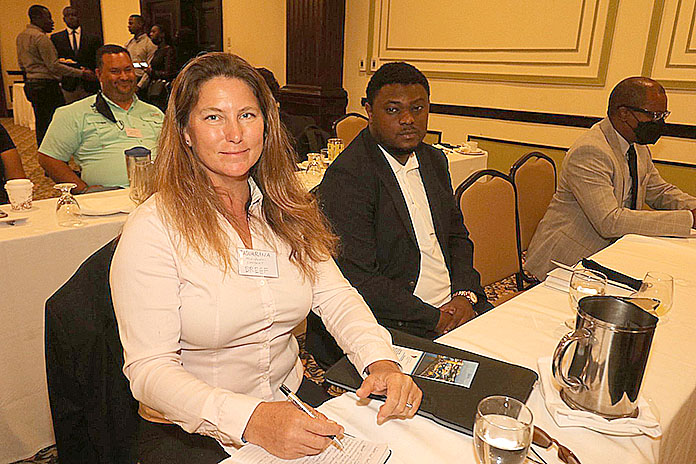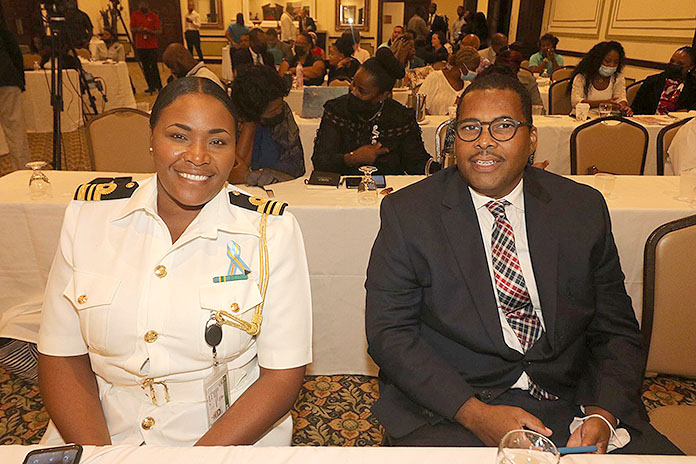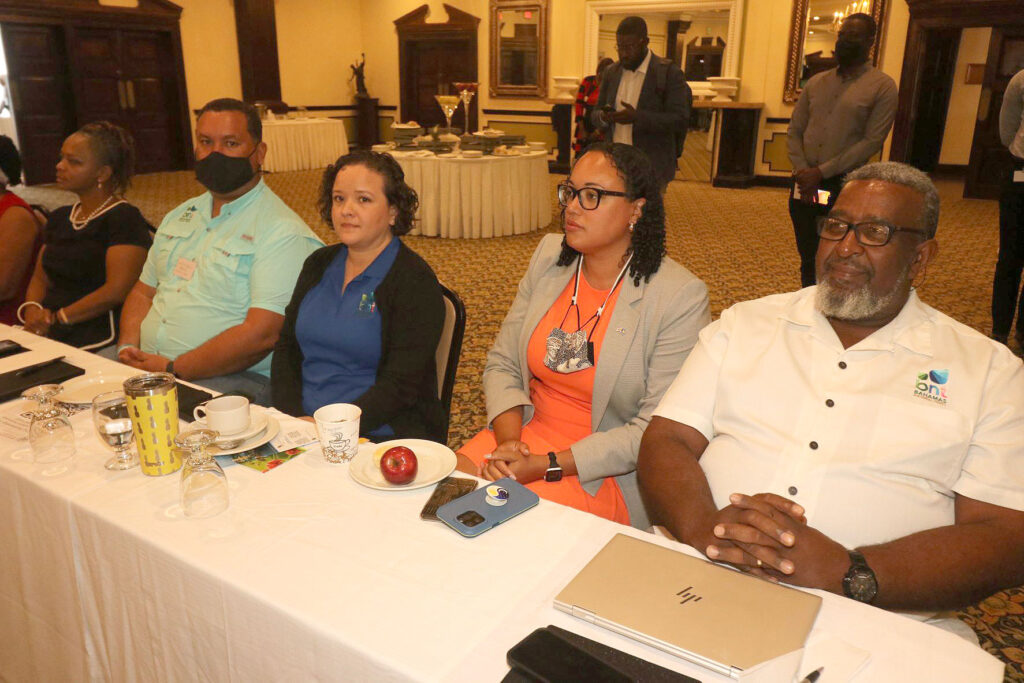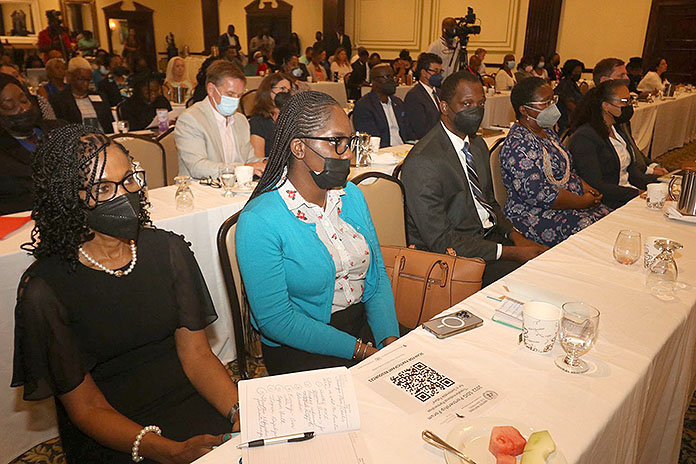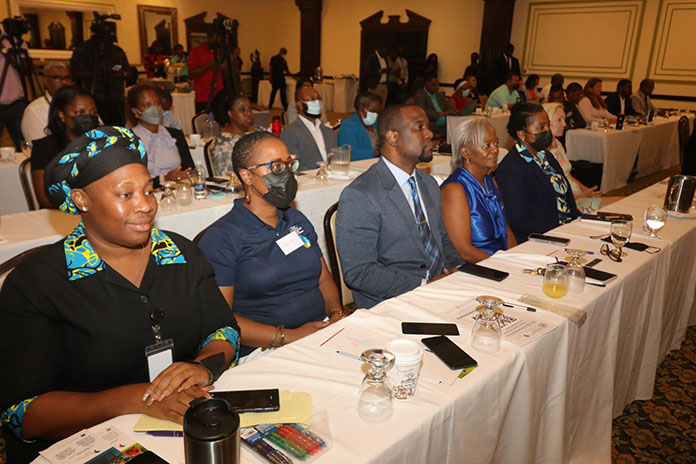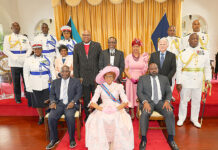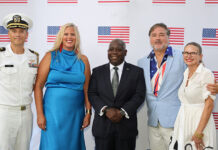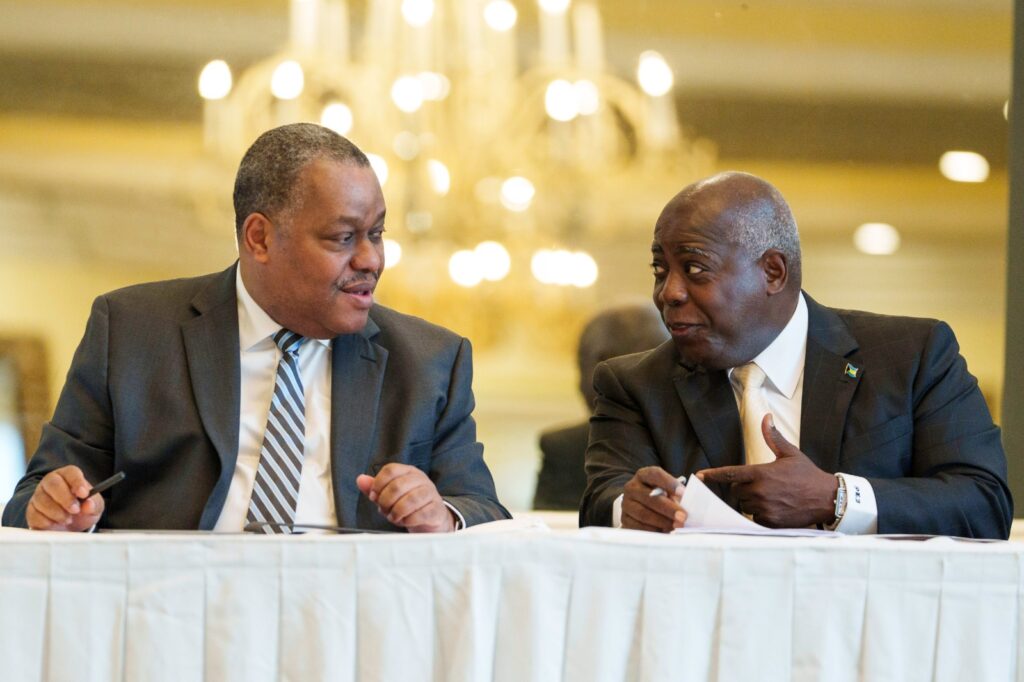
NASSAU, The Bahamas – During his Official Remarks to the 2022 United Nations / Bahamas Development Bank Sustainable Development Goals (SDG) Partnership Forum, on September 5, 2022, Prime Minister and Minister of Finance the Hon. Philip Davis noted that, when The Bahamas joined other members of the United Nations in signing the ‘Sustainable Development Goals Agenda’ in 2015, the underlying vision was to agree a “shared blueprint for peace and prosperity for people and the planet, now and into the future.”
“The SDGs were specific, tangible expressions of what ‘peace and prosperity’ would look like in each signatory country around the world,” Prime Minister Davis said at the inaugural forum, held at SuperClubs Breezes resort, under the theme ‘Transformational Partnerships for a Sustainable Future’. “The range and breadth of those goals, admirably reflected in your agenda today, also demonstrate the scale of the task.”
“These are not easy things to achieve,” he added. “And even if we suppose that there is sufficient political will to do so, fulfilling the Goals will be challenging.”
Prime Minister Davis noted that, since 2015, there had been progress in The Bahamas towards fulfilling a number of the SDGs. But, he said, there were goals that have remained stagnant or, indeed, have regressed.
“I understand that, it is for this reason, the Resident Coordinator’s Office has organised this Forum today,” he said. “By bringing together a number of interested parties, it is hoped that a number of multi-stakeholder partnerships will be developed, in an effort to advance progress of the SDGs in The Bahamas.
“I wholeheartedly support and endorse this initiative.”
Prime Minister Davis pointed out that, when he received his Instruments of Office as Prime Minister, and in the Speech from The Throne that followed, he committed his Administration to working in partnership with the Bahamian people. That, he stated, was “not an empty promise”.
“Over the course of the past year, many of our achievements in office have only been possible because of that partnership,” Prime Minister Davis said. “That said, it is unfortunate that too many of the institutional arrangements of government, are designed for people to work in silos.”
“While that may encourage specialisation, and reinforce lines of internal accountability, it does not work well when working towards goals that span several ministries or government departments,” he added. “For example, when we articulate our wish to empower young people, we clearly don’t expect that effort to be solely made by the Ministry of Youth.
“Education, Housing, Transport, Finance, Immigration, Labour, National Security, for example, will all play key roles in helping to fulfil that goal.”
Prime Minister Davis said that, by formalising and structuring partnerships appropriately, especially when they include the private sector and the non-governmental sector, they create a better foundation for success.
“The irony is, of course, that the more organisations and people that become involved, the more likely it is that bureaucracies and cultures and personalities will get in the way,” he said. “This is not to condemn the challenges, merely to observe that this is what human structures are like.”
“So what else can we do in order to promote success?” he asked. “A key tool is to ensure that we are all absolutely clear as to what the Priorities are. If we try to do everything all at once, or if we have differing ideas of what they are, then chaos and confusion is the more likely result.”
Prime Minister Davis pointed out that, to be clear, other SDGs were not being abandoned.
“The Priorities are just that: an ordering of the things we currently consider most urgent and most important,” he said.
Prime Minister Davis noted that, in the Office of The Prime Minister, they had set out the eight priorities his administration wished to focus on.
He said: Firstly ‘Health and National Health Insurance’, with an emphasis on guaranteeing universal access to healthcare. Secondly, ‘Energy’, with an emphasis on reducing the cost of energy and oil imports, and transitioning to renewable energies. Thirdly, ‘Education’. A specific focus is to empower Bahamians through mentoring and life-long training. Fourthly, ‘The Economy’.”
“At this point I should make clear that these Priorities are not in sequencing order; so we are not going to deal with Health and Education before we turn our attention to the Economy,” Prime Minister Davis pointed out. “They all sit together as National Priorities.”
He continued: “In respect of the Economy, we seek to grow the economy, whilst reducing the tax burden on Bahamians. Our Fifth Priority is to Empower the Youth of The Bahamas. The Sixth is to greatly improve the Digitization of the country, and enhance the Ease of Doing Business. Seventh, we seek to strengthen our mitigation, adaptation and recovery from the impact of climate change. And finally Eighth, to develop the national infrastructure to make it more resilient.”
Prime Minister Davis said he trusted that those Priorities did not come as a shock to any of those present at the Forum. He also invited those present to consider how closely their current efforts aligned with those Priorities.
“As I said at the beginning, progress has been made in some areas,” he said. “Many of them have benefitted from the efforts of sustained partnerships.”
After giving a more in-depth example of facets of his Government’s priority with the economy, Prime Minister Davis also highlighted the environmental, social and economic challenges that arose from being both a Small Island Developing State, as well as an archipelago.
“A very significant partnership was created when The Bahamas came together with other countries of a similar makeup to co-create the Small Island Developing States Accelerated Modalities of Action Pathway,” he said. “You may know it as the SAMOA Pathway.”
“This framework recognizes that Small Island Developing States have specific challenges and vulnerabilities,” Prime Minister Davis added. “These vulnerabilities include the high cost of infrastructure, transportation and energy. More existentially, they include increased vulnerability to the negative impacts of climate change, limited economic resources, and dependence on external markets.
“All of these vulnerabilities increase these nations’ susceptibility to external shocks.”
He noted that the SAMOA Pathway created a partnership between those states to create strength in numbers, by declaring their common challenges, and coming together to find ways to turn their challenges into shared integrated solutions and opportunities.
“In November, my Government will continue to advocate and negotiate on a range of economic, technical and geo-political issues at COP27, the United Nation’s Conference on Climate Change,” Prime Minister Davis pointed out.
“Just last month, The Bahamas took the lead on convening an inaugural meeting of Regional Heads of Government, to build consensus on regional negotiating positions in advance of COP27,” he added. “This effort sits alongside other initiatives to engage the young people throughout the Caribbean and other regional countries, to learn, discuss and garner momentum for youth advocacy on climate change and climate mitigation methods.”
“These partnerships amplify not only our voice, but our level of influence on how the big decisions are made.”
Prime Minister Davis said that that was what effective partnership could yield. He added that, at the local level, the push to address issues surrounding climate change was just as strong.
“There is a ‘Climate Change and Carbon Markets Initiative Act’ to aid in the global response to climate change and create initiatives to offset carbon emissions,” he said. “Officers under the Climate Change Advisory Unit are a part of the international UN Carbon Credits Committee that supports the Alliance of
Small Island States, Climate Change Carbon Markets Co-ordination and the Adaptation Committee.”
Prime Minister Davis pointed out that some of the effective partnerships his Government had brokered also extended to the energy sector.
“The Government has formed partnerships with both the International Development Bank, and the European Union, to enhance infrastructural development to advance renewable energy,” he said. “The project will allow for the construction of solar energy panels projects throughout The Bahamas.”
“This initiative is expected to benefit 13,000 to 17,000 residents,” Prime Minister Davis added. “Abaco should benefit especially.
“The installation of micro-grids should vastly improve the island’s electricity infrastructure, which is still severely weakened from the impact of Hurricane Dorian.”
Prime Minister Davis noted that, on the digitization front, there will soon be the official launch of the Digi-Innovative Projects Programme overseen by the Digital Transformation Unit, the Small Business Development Centre, and the Bahamas Development Bank.
That initiative, he said, sought to promote information and communication technology ideas that will improve innovation in the public sector. “The programme will encourage people around The Bahamas to present their ideas on technology and innovation,” Prime Minister Davis pointed out. “Ordinary people will have the opportunity to contribute directly to the advancement of technology in Government.
“Prizes will be awarded to successful submissions.”
Prime Minister Davis noted that the SDGs were heavily incorporated into the Bahamas’ National Development Plan. The document, he said, provided a roadmap for the country’s development, by creating a comprehensive policy framework to guide government decision-making.
“In my Lecture to the University of The Bahamas in July, as part of the Independence Celebrations, I set out the principles and values under which my administration will implement the National Development Plan,” he said. “If you have not already done so, I encourage you all to read it, that it might deepen and strengthen your own approach to the Sustainable Development Goals.”
“Finally, I wish to highlight the Multi-Country Sustainable Development Cooperation Framework,” Prime Minister Davis added. “The Government has signed onto the Framework, and is thrilled to see the commencement of the implementation of this instrument in the upcoming months.”
Prime Minister Davis noted that that Framework will operate as an Accelerator for SDGs to facilitate partnerships between the various sectors in government, civil society, local and international non-governmental organizations.
“With this, and every initiative that each of you is working on, I thank you for all that you are doing, and wish you every success,” he added.
“What you are doing has the powerful capacity to transform our country for the better.”
